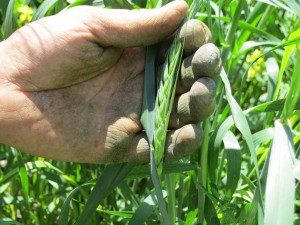
In Montana, a group of farmers are addressing their seed availability concerns head-on. Their goal: to build a reliable supply of open-pollinated varieties of various crops that are well-adapted to Montana’s climate. A seed cooperative is in the works.
Jacob and Courtney Cowgill of Prairie Heritage Farm in Conrad are dedicated to preserving heritage breeds, whether its grain, vegetables, or livestock. This winter they joined a group of Montana farmers in attending OSA’s Organic Seed Growers Alliance in Port Townsend, Washington, and started discussing how best to create a source of Montana-grown seeds.
Speaking to the Great Falls Tribune, Jacob said the group wants to build a strong, resilient seed supply for Montana:
Cowgill points out that many of the seed companies — where most commercial growers and gardeners in Montana buy their seeds each year — are thousands of miles from where the seed will be planted. Some of the most popular companies are in the Northeast. While their latitude is similar to Montana, there are a lot of differences in our growing conditions.
“How will that plant perform in our environment?” asked Cowgill.
By growing the varieties here, and harvesting the best performing examples, growers develop plants that are adapted to the variable growing conditions in Montana.
The other reason the Montana cooperative wants to build a cohesive seed-saving group is because of consolidation of seed companies. Even some seed companies that started as small co-ops with a goal of keeping heirloom and open pollinated varieties on the market are often bought up by large conglomerates. Since the bottom line dictates what appears in the catalogs, old varieties can be left behind.
“Companies may retire seeds, and you lose your favorite variety,” said Cowgill. “We’re losing a lot of variable genetics as the seed companies consolidate.”
He said by forming this Montana cooperative we’re empowering ourselves to take back control of our seed supply. And, in the process, we’re creating cultivars that thrive in Montana.
(Photo of Ethiopian Blue Tinge wheat trial provided by Jacob Cowgill of Prairie Heritage Farm)
